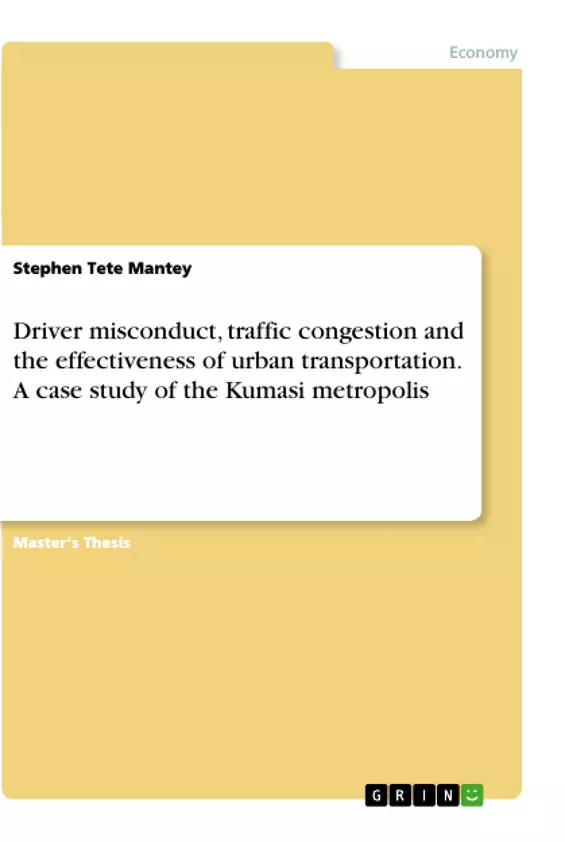The main aim of this study was to determine the causes of driver misconduct and traffic congestion, examine the relationship between driver misconduct and effectiveness urban transportation. It examines the influence of traffic congestion on the relationship between driver misconduct and effectiveness of urban transportation. A case study research design was used and the Kumasi metropolis was adopted as the case. The study relied on managers of transportation stations, drivers, passengers and other people familiar with the function of the transportation sector. Data was accordingly collected from these people through the use of questionnaires.
Observations were also made to confirm some of the responses. Three hundred respondents were selected through the purposive and convenient sampling techniques. The study found that the major causes of driver misconduct and traffic congestion included; talk-testing, inadequate road signs and markings and illegal crossing of pedestrians. Interestingly, the study found that driver misconduct was not a major contributor to the level of effectiveness of urban transport but that the traffic congestion due to inadequate infrastructure rather significantly affects driver misconduct. The study concludes that traffic congestion rather than driver misconduct affects the efficiency of the transport system in Ghana. It is therefore recommended that much attention should be paid to expanding the transport infrastructure to improve upon the efficiency of the transport system in Ghana.
Inhaltsverzeichnis (Table of Contents)
- CHAPTER ONE
- INTRODUCTION
- 1.0 Background to the Study
- 1.1 Statement of the Problem
- 1.2 Objectives of the Study
- 1.3 Research Questions
- 1.4 Significance of the Study
- 1.5 Scope of the Study
- 1.6 Research Methodology
- 1.7 Limitation of the Study
- 1.8 Organization of the thesis
Zielsetzung und Themenschwerpunkte (Objectives and Key Themes)
The main objective of this thesis is to analyze the relationship between driver misconduct, traffic congestion, and the effectiveness of urban transportation in the Kumasi metropolis. This study aims to pinpoint the causes of driver misconduct and traffic congestion while assessing how these factors impact the efficiency of the urban transportation system.
- Causes of driver misconduct and traffic congestion
- Relationship between driver misconduct and urban transportation effectiveness
- Influence of traffic congestion on the relationship between driver misconduct and urban transportation effectiveness
- Assessment of the effectiveness of urban transportation in Kumasi
- Recommendations for improving the efficiency of the transportation system in Kumasi
Zusammenfassung der Kapitel (Chapter Summaries)
The thesis begins by introducing the background of the study and outlining the research problem. It then delves into the objectives, research questions, significance, scope, methodology, and limitations of the study. The thesis will go on to provide a detailed analysis of driver misconduct, traffic congestion, and their impact on urban transportation effectiveness. It will also explore the factors that contribute to these challenges and propose solutions to improve the efficiency of the transportation system in Kumasi.
Schlüsselwörter (Keywords)
The core keywords of this thesis include: driver misconduct, traffic congestion, urban transportation, effectiveness, Kumasi metropolis, Ghana, transportation infrastructure, transportation system efficiency. The study focuses on the relationship between these factors, analyzing their impact on the overall efficiency of urban transportation in Kumasi.
Frequently Asked Questions
What are the main causes of traffic congestion in Kumasi?
Key causes include inadequate road signs and markings, illegal crossing of pedestrians, and talk-testing during driving.
Does driver misconduct significantly impact transport effectiveness in Ghana?
The study found that driver misconduct is not the major contributor; instead, inadequate infrastructure and resulting congestion have a more significant impact.
How does traffic congestion affect driver behavior?
Traffic congestion caused by poor infrastructure significantly contributes to and influences driver misconduct.
What was the methodology used for this case study?
The researcher used a case study design, collecting data through questionnaires and observations from 300 respondents including drivers, passengers, and managers.
What is the main recommendation for improving urban transport in Kumasi?
The study recommends expanding transport infrastructure to improve the overall efficiency of the system.
- Quote paper
- Stephen Tete Mantey (Author), 2018, Driver misconduct, traffic congestion and the effectiveness of urban transportation. A case study of the Kumasi metropolis, Munich, GRIN Verlag, https://www.grin.com/document/514045



